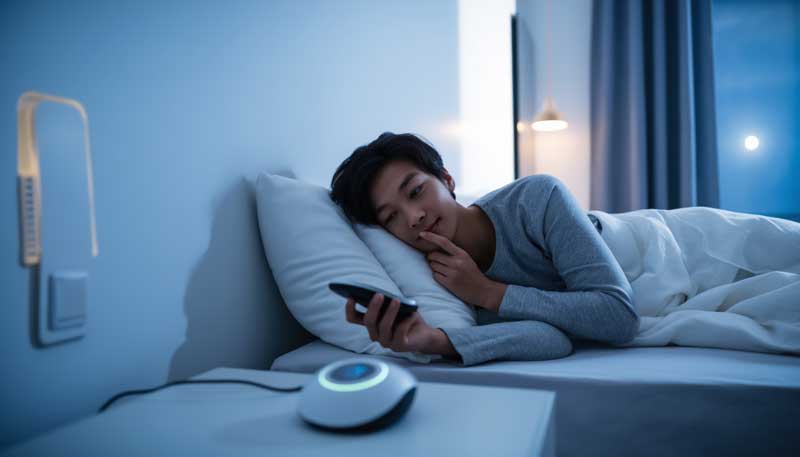Sleep ➢ Sleep Science
The Science of Sleep: How Technology is Revolutionizing Rest in 2025

Sleep science has undergone a remarkable transformation in recent years, evolving from basic understanding of sleep cycles to sophisticated, personalized sleep optimization systems. Modern technology is not just monitoring our sleep—it's actively improving it through intelligent interventions, environmental controls, and data-driven insights that were impossible just a decade ago.
The convergence of artificial intelligence, advanced sensors, and medical research has created a new era of sleep technology that goes far beyond simple sleep tracking. Today's innovations can predict sleep disorders, optimize sleep environments in real-time, and provide personalized interventions that significantly improve both sleep quality and overall health outcomes.
Advanced Sleep Monitoring and Analysis
Modern sleep monitoring has evolved far beyond basic movement tracking. Today's systems use multiple biometric sensors, including heart rate variability, breathing patterns, skin temperature, and even brain wave activity to create comprehensive sleep profiles that reveal intricate details about sleep quality and health indicators.
AI-powered sleep analysis can now detect early signs of sleep disorders, track the effectiveness of interventions, and identify patterns that correlate with daytime performance, mood, and cognitive function. These systems learn individual sleep patterns and can predict optimal bedtimes, wake times, and sleep environment adjustments.
Contactless monitoring technology uses radar and audio analysis to track sleep without requiring wearable devices, making long-term monitoring more comfortable and accessible. These systems can monitor multiple people simultaneously and integrate with smart home systems for automated optimizations.
Smart Sleep Environment Control
Intelligent bedroom environments now automatically adjust temperature, humidity, lighting, and air quality throughout the night to maintain optimal sleep conditions. These systems learn individual preferences and can make micro-adjustments that improve sleep quality without causing conscious awareness.
Advanced mattress technologies incorporate heating and cooling zones, firmness adjustments, and even gentle vibrations that can enhance deep sleep phases or ease wake-up transitions. Some systems can detect snoring and automatically adjust sleeping position or environmental factors to reduce disturbances.
Smart lighting systems that mimic natural circadian rhythms have become increasingly sophisticated, with personalized light therapy protocols that can help reset disrupted sleep schedules, combat seasonal affective disorder, and optimize alertness patterns for shift workers.
Personalized Sleep Optimization
Machine learning algorithms now analyze individual sleep data alongside lifestyle factors, stress levels, diet, and exercise patterns to provide highly personalized sleep improvement recommendations. These systems can identify which specific factors most significantly impact individual sleep quality.
Adaptive sleep coaching systems provide real-time guidance on sleep hygiene, relaxation techniques, and behavioral modifications tailored to individual sleep challenges and goals. Some systems integrate with mental health apps to address anxiety and stress that commonly interfere with sleep.
Genetic testing for sleep-related traits is becoming more accessible, allowing for personalized recommendations based on individual circadian rhythm genetics, caffeine sensitivity, and predisposition to certain sleep disorders.
Sleep Disorder Detection and Prevention
Early detection systems can now identify sleep apnea, restless leg syndrome, and other sleep disorders weeks or months before they would typically be diagnosed through traditional methods. This early intervention capability can prevent serious health complications and improve quality of life significantly.
Predictive models analyze patterns in sleep data to forecast potential sleep disturbances before they occur, allowing for proactive interventions such as environmental adjustments, schedule modifications, or stress management techniques.
Telemedicine integration allows sleep specialists to monitor patients remotely and adjust treatment protocols based on continuous data collection rather than periodic clinic visits, leading to more effective and responsive care.
Recovery and Performance Enhancement
Athletic performance and cognitive function optimization through sleep technology has become increasingly sophisticated. Systems can now recommend specific sleep strategies to enhance memory consolidation, reaction times, and physical recovery based on individual performance goals.
Recovery monitoring systems track how well sleep is facilitating physical and mental restoration, providing insights into when additional rest is needed or when current sleep strategies are optimally supporting performance goals.
Integration with fitness and nutrition tracking provides comprehensive lifestyle optimization recommendations that consider sleep quality as a foundational element of overall health and performance.
Social and Family Sleep Health
Family sleep monitoring systems can track and optimize sleep for multiple household members simultaneously, identifying how family members' sleep patterns affect each other and providing recommendations for improved household sleep hygiene.
Partner sleep compatibility analysis helps couples understand how their individual sleep patterns, movement, and environmental preferences interact, with recommendations for optimizing shared sleep environments without compromising individual needs.
Child sleep development tracking provides parents with detailed insights into how their children's sleep patterns are developing and offers evidence-based recommendations for supporting healthy sleep habits from infancy through adolescence.
Mental Health and Sleep Integration
The connection between sleep and mental health is being illuminated through sophisticated monitoring that can detect mood patterns, stress levels, and anxiety indicators through sleep data analysis. This integration allows for more comprehensive mental health support.
Therapeutic sleep interventions now include guided meditation, breathing exercises, and cognitive behavioral therapy for insomnia (CBT-I) delivered through smart devices with proven effectiveness comparable to in-person therapy.
Real-time stress detection during sleep allows systems to implement immediate interventions such as calming sounds, temperature adjustments, or gentle vibrations to prevent stress-related sleep disruptions.
The Future of Sleep Technology
Emerging technologies promise even more sophisticated sleep optimization, including molecular-level sleep analysis, pharmaceutical precision dosing for sleep aids, and neural interface technologies that could directly influence sleep architecture for therapeutic purposes.
The integration of sleep optimization with broader health ecosystems means that sleep data will increasingly inform medical decisions, lifestyle recommendations, and even work schedule optimizations as employers recognize the critical role of sleep in productivity and well-being.
As our understanding of sleep's role in learning, memory, immune function, and longevity continues to expand, sleep technology will likely become as fundamental to health management as nutrition and exercise, with personalized sleep optimization becoming a cornerstone of preventive healthcare.
Share this article:
React to this article: